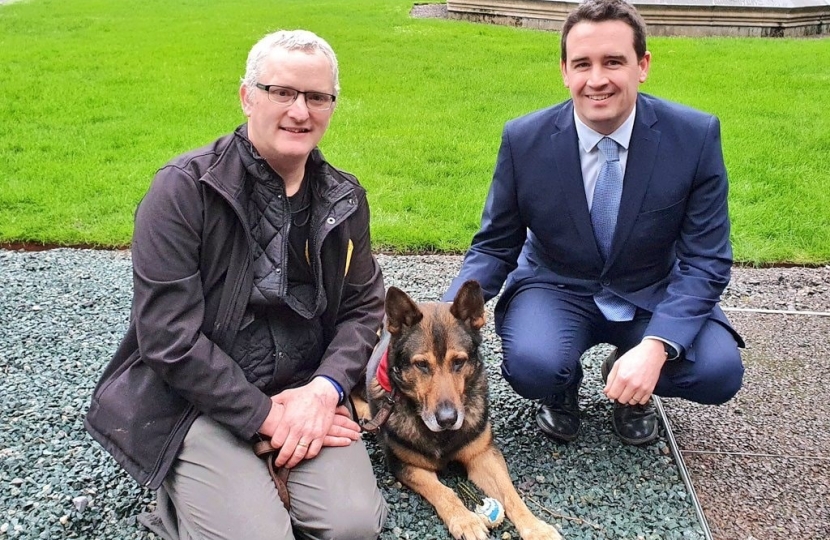Speaking in support of the Animal Welfare (Sentencing) Bill 2019-21 ("Finn's Law Part 2") in Parliament on Friday, Vale of Clwyd MP Dr James Davies called for individuals convicted of the most serious violence towards animals, to “not be trusted to keep animals again”.
Taking part in the House of Commons debate on the Bill, James also made a plea for powers in the legislation to be used to their full extent, highlighting that in England and Wales last year, there were 1,218,364 reports of animal cruelty, but just 661 convictions in court.
He also spoke of support in the Vale of Clwyd for the Bill.
He said:
“For too long, the most violent abusers of animals have been able to stain the UK’s otherwise proud record on animal welfare. The current array of potential deterrents, including fines, a ban on keeping animals and a maximum of six months in prison, has simply not been strong enough, with calls to the RSPCA cruelty line increasing by almost 50,000 between 2018 and 2019, to a shocking 1.2 million.
“In preparing for the debate, I learned of some examples where punishments were not, in my opinion, in any way adequate. In one case, a cat was left in a washing machine for hours before it ultimately died. The perpetrator received only a disqualification from keeping animals for five years.
“We should not and cannot allow the perpetrators of such acts to receive overly lenient punishments. This Bill, which will increase the maximum sentence for animal cruelty offences in England and Wales from six months to five years, is absolutely necessary to deter people from inflicting harm and death on defenceless animals.
“My Vale of Clwyd constituents agree. Canine behaviourist Adam Hobbs has worked alongside rescue centres, including North Clwyd Animal Rescue, for more than 15 years, and often helps to rehabilitate dogs that have been the victim of sustained neglect or acts of violence. He told me that one of the most difficult aspects of working on cruelty cases is trying to comprehend how the perpetrators face no real consequence or deterrent from repeating their atrocious behaviours. Rehabilitating and caring for victims of animal abuse takes a huge emotional toll on those involved. Knowing that the evil people who cause such suffering face almost no barriers to causing such dreadful acts again is simply soul-destroying.”
James stressed that the Bill will form a “a vital pillar of our national approach to animal welfare matters that will be respected the world over”, pointing out that at present the UK is woefully behind other countries, such as Australia, Canada and India, where the maximum punishment for animal cruelty is five years in prison.
He added:
“However, two additional points should be considered. Even under the rules that we are discussing, if an individual is convicted of the most serious violence towards animals, I suggest that they should not be trusted to keep animals again.
“The Dogs Trust is calling for an automatic ban on owning animals for a person convicted of animal cruelty offences. I am sympathetic to its justification that the change would not only be preventive, in that it would stop the worst abusers keeping animals, but would also add an extra layer of deterrent. I do not want to see the passage of the Bill disrupted - we have waited long enough to see this change - but I would be grateful if an automatic ban could be considered in greater detail in Committee.
“Rather than a comment on the provisions of the Bill, the second point is more a plea that the powers in the Bill are used to their full extent.
“Unless there is monitoring and enforcement of the new legislation, the advantages brought by the Bill will be negligible. By working with local authorities and relevant organisations, and by ensuring clarity on sentencing guidelines, as called for by Battersea Dogs and Cats Home, I hope the Government will be able to ensure that the benefits of this Bill are seen throughout England and Wales.
“This Bill is a valuable tool in our fight against animal cruelty. Clearly, the provisions have support from across the House and the Government, as they have done for many years, and I very much look forward to seeing the Bill progress.”

